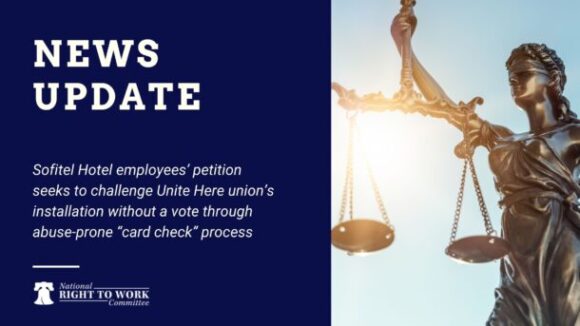Foundation Fires Back Against Biden NLRB ‘Card Check’ Mandate
Brief challenges Labor Board’s attempt to expand coercive, anti-employee organizing scheme
David Elbert of the Des Moines Register says all the pro-Big Labor lifting Iowa Democrats have done for the union bosses is a gift to the Republican Party. First they tried to repeal the Hawkeye State Right to Work Law, and now Democrats want Gov. Chet Culver to sign a bill giving state employee unions monopoly bargaining rights for taxpayers’ money.
Democratic leaders rammed the legislation through while Culver was on spring break with his family in Florida on the presumption that he would quietly sign it. Instead, he’s turned a spotlight on the somewhat shady process and handed Republicans a campaign issue that might help them regain control of the Iowa House in November.
The issue is House File 2645, which would strengthen the hand of public employee unions at the bargaining table by widening the scope of issues that are likely to go to arbitration to include work rules, disciplinary actions and other issues that previously received little consideration at bargaining sessions.
It would be the first significant change to Iowa’s public employee bargaining law since it was passed in 1974 by a bipartisan Legislature and approved by Republican Gov. Robert Ray. That law allows public employees to join unions and bargain for wages and benefits, but they cannot strike. Impasses are resolved through binding arbitration. . . .
. . . The Iowa House is the key chamber for this or any other piece of labor legislation, because Democrats hold a slimmer 53-47 lead there, while in the Senate they have a 10-vote edge.
Last year, the House killed the so-called “fair share” labor bill that would have let unions collect money from the paychecks of nonunion members to cover certain union expenses.
Like the measures contained in House File 2645, fair share was barely mentioned during the 2006 campaign. Nonetheless, fair share was on track early in last year’s session to pass both houses with the expectation that Culver would sign it, until the heat became too much and a handful of House Democrats bailed out. Leaders knew they couldn’t get the 51 votes they needed, so they never brought it to the House floor.
After fair share, Democratic leaders apparently decided to wait this year until the end of the session to push through the public employees work-rules bill.
It passed the House with one vote to spare, 52-47. It passed the Senate on a vote of 27-23 a few days later.
Culver wants the bill to go back for reconsideration because there was no public input. That’s a highly unusual move for a bill that’s already passed both houses.
If that happens, though, officials say the bill would probably get fewer than 51 votes and fail.
Today, Culver is the only thing keeping the bill from becoming law.
He’s between a rock and a hard place, and Republicans love it.
If you’re a GOP strategist, it probably doesn’t matter what Culver does, because once the law passes even one house, it’s fair game for the fall campaign.
Now that the governor has stood up against the bill, Republicans can use his words against his party’s candidates in the fall election.
If he signs it, so much the better. Republicans would call him a hypocrite.
The thing that has a lot of people scratching their heads is why Democrats in the Legislature went ahead and passed the bill without getting a sign-off from their own governor.
There’s two ways to look at that. Either they got a sign-off and Culver reneged, or they didn’t tell him what they were up to and just assumed he’d go along. After all, he was on board last year for fair share.
Judging by Culver’s reaction, they didn’t tell him.
That was clearly a strategic mistake.
Brief challenges Labor Board’s attempt to expand coercive, anti-employee organizing scheme

Josh Hawley distances himself from pro-Right to Work pledges, aligning with union bosses like the Teamsters, despite their history of corruption.

Sofitel Hotel employees’ petition seeks to challenge Unite Here union’s installation without a vote through abuse-prone “card check” process